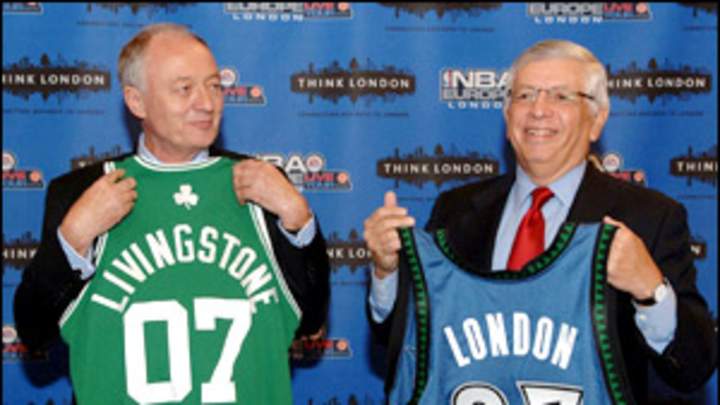Have game, will travel

The initiative promises to be the big news of All-Star weekend in New Orleans, where international basketball officials are arriving this week for their annual meetings with the NBA. Stern is expected to reveal the league's new stance at a news conference Saturday, according to a league source.
The current idea would be to create five new teams in major markets to form a "European'' division within the NBA. The teams would play the full 82-game schedule and compete for the NBA championship. But the proposal is new and many factors will influence the eventual outcome, the league source said.
This will not be the first time Stern has proposed expansion overseas. In 2003, he said the league would investigate planting teams in Europe within a decade, but then shelved the proposal as the NBA focused on developing profitable relationships with China and other emerging markets.
Those relationships have helped Stern formulate a new two-pronged approach to growing the business of the NBA and world basketball in general.
Stern's preference has been to develop international partnerships with local federations and business interests, as in the formal announcement last month of NBA China. ESPN and four Chinese investors have already pledged $253 million to the nascent project.
According to the league source, Stern has realized that it's much easier to do business in emerging basketball markets than in Western Europe, where government regulation as well as the basketball organizing bodies -- the complex network of old-world federations that run the sport in each country and throughout Europe -- have choked off attempts to turn European basketball into a profitable enterprise since the opening of the Berlin Wall almost 20 years ago.
"Say you put five teams there in NBA buildings and see what happens,'' the NBA source said of plans to expand to Europe. "Because then it's out of the hands of the governments; it's an American company with American divisions operating in Europe.''
Pro basketball remains a minor sport throughout Western Europe, with a low-scale popularity not unlike that of soccer in the United States. In an interview with Sports Illustrated two years ago, former NBA player Sarunas Marciulionis, a Lithuanian who founded the Northern European Basketball League, outlined the problems in Europe while calling on Stern to preside over a summit to overhaul basketball on the continent.
"There are no big brands -- none -- connected with high-scale basketball in Europe because it's a mess,'' Marciulionis said while attending the 2006 All-Star Game in Houston. "We need one structure, one clean pyramid. I think David could unite Europe. I think they would listen to him.''
Nothing came of Marciulionis's proposal: The Europeans declined to ask for Stern's leadership, and at that time Stern told SI that he was neither interested in expanding the NBA to Europe, nor was he willing "to intrude'' in the affairs of the European leagues.
But the landscape has changed with the emergence of NBA-styled arenas in Europe. The 02 Arena in London and the soon-to-be-opened 02 Arena in Berlin (both named after a mobile phone sponsor in Europe) are NBA-ready venues outfitted with the necessary suites and amenities. In addition, Rome has broken ground on a new arena, and Real Madrid is expected to begin construction soon on a new building in Spain. Those four cities would be among the leading candidates to receive NBA franchises in the next decade, if Stern pursues his vision. But the expansion is predicated on more arenas being built in Europe in coming years.
Stern has long said that the absence of NBA-sized buildings had been the biggest obstacle to putting franchises in Europe. Now that a marketplace is developing for large arenas capable of providing revenue streams to support NBA franchises, the league can seriously begin to consider expansion overseas.
There is a sense that the clock is ticking down on the league's long-term plan to grow basketball in Western Europe. With NBA-ready buildings sprouting up, the source suggested that Stern feels the need to move before a competing entity seizes the opportunity of moving into those arenas and starting up a new European league from scratch.
Of course, there would be many issues. Would European audiences buy expensive season tickets to 41 home games per year? Would they adapt to the American dynamic of sport as entertainment, equivalent to attending a concert or the cinema? Could the NBA sustain expansion to as many as 35 teams? Would American players be willing to play overseas? And how would teams adapt to the transatlantic road trips?
European basketball officials have been skeptical that the NBA could succeed in the Old World. But others view the success of European soccer's Champions League -- in which huge numbers of fans have watched the best players in the world without necessarily having a rooting interest in the teams -- as an indication that the NBA model could succeed in Europe.
There is little room for the NBA to expand its business domestically. If Stern decides to move overseas, he will do so based on the availability of new venues and the perspective that there are no better options for growing the game in Europe.
"We need to do more market research, of course,'' the league source said. "But in the end there's only one way to find out, and that's by going there and doing it.''
